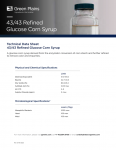WATCH... Amyris: 'Our Reb M has the highest purity on the market today, and the best taste profile'
Speaking to FoodNavigator-USA at the IFT annual meeting and Expo in June, Oreste Fieschi, president of sweeteners and ingredients at Amyris, said producing the scarcest steviol glycosides via fermentation offered significant benefits over extracting them from stevia plants, including greater efficiency, consistent purity, and lower water and land usage.
He added: “The [global] sweetener market including sugar is $90bn. $10bn out of that is other alternatives, and stevia is around $2bn. And if you consider the ratio that our products have been approved in the industry, and the projects that we have [in the pipeline], then yes, we still believe in this objective…
“Our molecule has the highest purity on the market today and the best taste profile.”
Amyris has studied how the stevia plant creates Reb M and reverse engineered the process in order to reproduce the molecule using a different production platform, said Fieschi.
Yeast and other microbes are increasingly being used as production platforms for cannabinoids, sweeteners, flavors, colors and proteins via fermentation because the approach is claimed to be more efficient - and sustainable – than raising animals or devoting vast tracts of land to growing plants in order to extract molecules that might only be found in the plant in microscopic quantities.
While the yeast is genetically engineered, there is no yeast in the final product, as it serves as a catalyst to convert sugar into Reb M.
Asked how this compared to what Cargill and DSM are doing with Eversweet (they too are producing Reb M via a fermentation process using an engineered yeast strain), he claimed that Amyris's yeast strains were more efficient, and delivered higher levels of purity.
purecane is produced in Brazil next to a sugar cane processing plant said Fieschi, who said Amyris had struck a deal with ASR (American Sugar Refining) Group, the world’s largest cane sugar refiner and one of the world’s leading marketers of sugar and sweeteners.
While Reb M – which is found in tiny quantities in the stevia leaf - can be extracted from the plant, it is more efficient and sustainable to produce the same molecule via a fermentation process with sugar, claims Amyris.





















